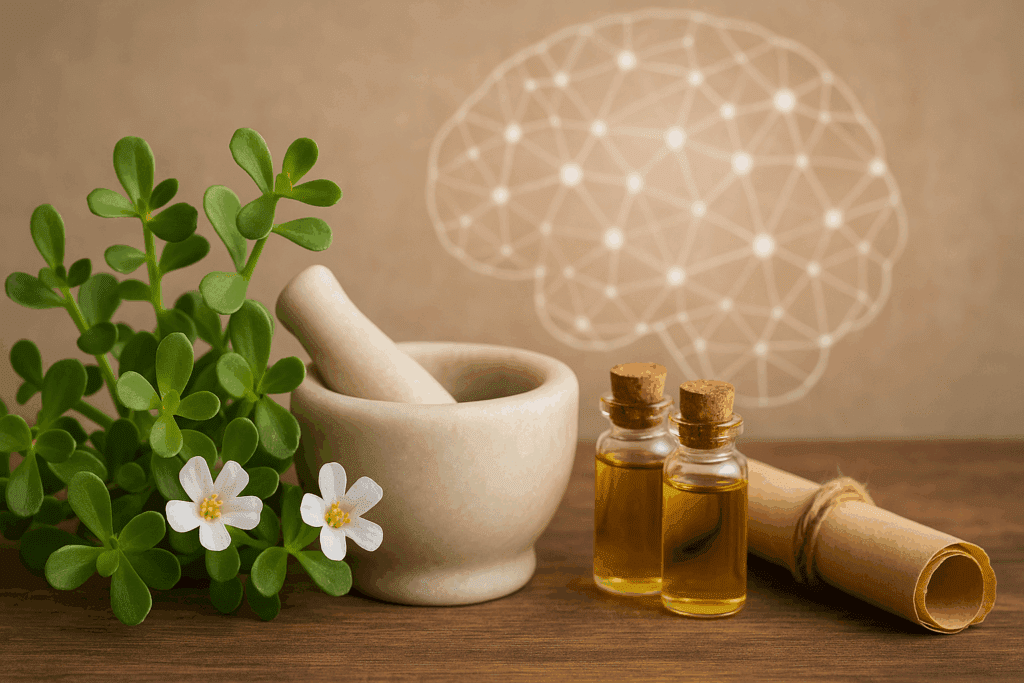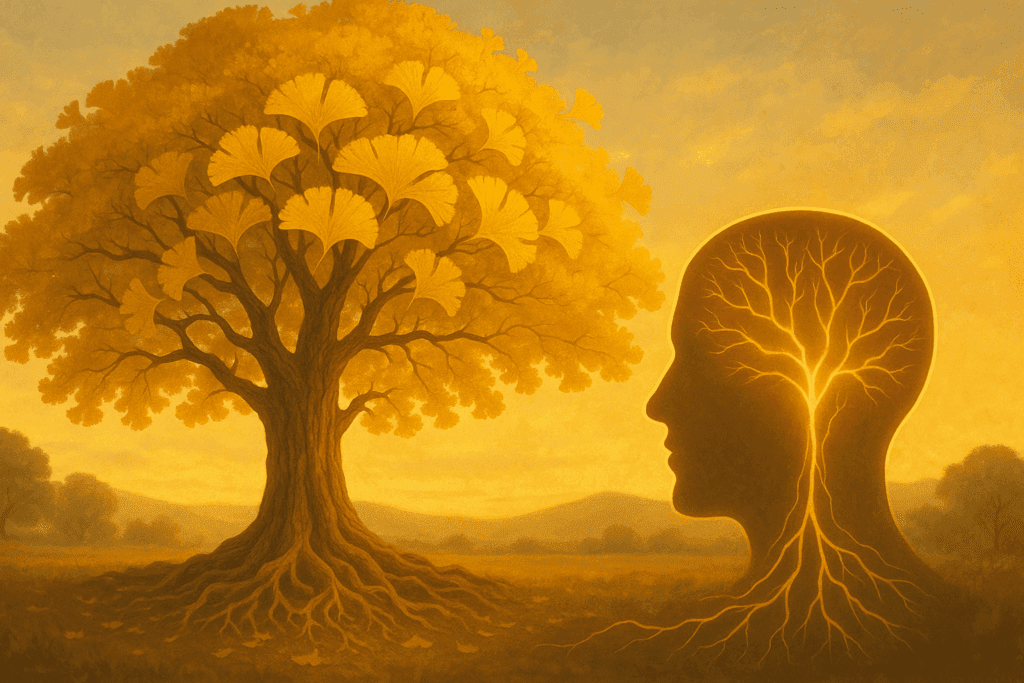Introduction: Exploring the Power of Herbs for Mental Clarity and Focus
In today’s fast-paced world, maintaining mental clarity and focus has become more important than ever. The increasing demands of work, education, and daily life often push individuals to seek natural remedies that can support brain health without the side effects commonly associated with synthetic stimulants. For centuries, herbs for clarity and herbs for clarity and focus have been valued across cultures for their ability to enhance cognitive performance, memory, and mental stamina. Modern research is now beginning to validate many of these traditional uses, offering scientifically grounded insights into how these botanical allies work to support the brain.
You may also like: Where to Buy Bacopa Monnieri: How to Find Quality Supplements for Cognitive and Memory Support
This article explores the top herbs for clarity and focus, providing a detailed examination of their historical context, mechanisms of action, and practical applications. Whether you are a student facing exams, a professional navigating complex projects, or simply someone interested in optimizing mental performance naturally, understanding how specific herbs can enhance cognitive function is both empowering and practical. We will delve into individual herbs, examine the science behind them, and offer guidance on how to incorporate them into your wellness routine safely and effectively.

Understanding the Brain’s Need for Clarity and Focus
Before discussing specific herbs for clarity and focus, it is crucial to understand what cognitive clarity and focus actually entail. Mental clarity refers to the ability to think clearly, process information efficiently, and maintain sharpness in decision-making. Focus, on the other hand, involves sustaining attention on a specific task or set of thoughts over a period of time without becoming distracted.
Several physiological processes underlie these mental functions. Neurotransmitters such as dopamine, acetylcholine, and norepinephrine play significant roles in modulating attention and clarity. Additionally, cerebral blood flow, mitochondrial energy production, and stress hormone regulation contribute significantly to cognitive performance. When these systems are optimally balanced, individuals experience enhanced mental agility, better memory retention, and sharper focus.
However, factors such as chronic stress, poor diet, sleep deprivation, and environmental toxins can impair these processes, leading to brain fog, poor concentration, and cognitive fatigue. This is where herbs for clarity and herbs for clarity and focus come into play, offering natural support to help restore and maintain optimal brain function.
Ginkgo Biloba: The Ancient Tree of Cognitive Renewal
One of the most extensively studied herbs for clarity and focus is Ginkgo biloba. Known as a “living fossil,” this ancient tree species has been revered for millennia for its medicinal properties. Traditional Chinese medicine has long utilized Ginkgo to treat memory problems, enhance blood circulation, and promote overall brain health.
Scientific research supports these traditional uses, indicating that Ginkgo biloba enhances cerebral blood flow, particularly in the prefrontal cortex, which is responsible for decision-making and executive function. By improving oxygen and nutrient delivery to brain cells, Ginkgo can help sharpen mental clarity and support sustained focus. Furthermore, its antioxidant properties help protect neurons from oxidative stress, a major contributor to cognitive decline.
Studies have demonstrated Ginkgo’s potential in improving memory recall, attention span, and processing speed, especially in aging populations. While results can vary based on formulation and dosage, standardized extracts containing 24% flavone glycosides and 6% terpene lactones are considered the most effective.
Incorporating Ginkgo biloba into your regimen may involve taking standardized supplements, using tinctures, or even consuming Ginkgo-infused teas. As with all herbs for clarity and focus, it is essential to consult with a healthcare professional, especially if you are taking blood thinners, as Ginkgo may increase bleeding risk.

Bacopa Monnieri: The Brain Tonic from Ayurveda
Bacopa monnieri, also known as Brahmi, is another herb deeply rooted in traditional medicine, particularly Ayurveda. Traditionally used to enhance memory, intellect, and longevity, Bacopa has gained modern scientific attention for its nootropic properties.
Research indicates that Bacopa exerts its cognitive effects by modulating levels of acetylcholine, a neurotransmitter associated with learning and memory. It also enhances synaptic communication between neurons and upregulates the body’s own antioxidant defenses, protecting the brain from oxidative damage. Importantly, Bacopa promotes neuroplasticity—the brain’s ability to form new neural connections—making it highly valuable for learning and adaptability.
Clinical studies have shown that Bacopa supplementation can significantly improve memory acquisition, information retention, and cognitive processing speed. Unlike stimulants, which offer immediate but short-lived boosts, Bacopa provides gradual, cumulative cognitive benefits over several weeks of consistent use.
When selecting Bacopa products, look for those standardized to 50% bacosides, the active compounds responsible for its cognitive-enhancing effects. Many people incorporate Bacopa through capsules, powders, or traditional preparations like Brahmi ghee. Patience is key, as the full cognitive benefits typically manifest after 8 to 12 weeks of consistent use.
Rhodiola Rosea: The Adaptogen for Cognitive Resilience
While herbs for clarity and focus often emphasize memory and attention, cognitive resilience—the ability to maintain mental performance under stress—is equally vital. Rhodiola rosea, a revered adaptogen, excels in this area. Native to cold mountainous regions of Europe and Asia, Rhodiola has a long history of use in enhancing stamina, endurance, and mental alertness.
Rhodiola works by modulating stress response systems, particularly the hypothalamic-pituitary-adrenal (HPA) axis. By balancing cortisol levels and enhancing serotonin and dopamine availability, Rhodiola helps mitigate mental fatigue, sharpen concentration, and sustain cognitive performance under pressure. In this way, it complements other herbs for clarity by targeting the stress-related roots of cognitive dysfunction.
Multiple clinical trials have demonstrated that Rhodiola supplementation can reduce mental fatigue, improve mood, and enhance cognitive performance during periods of stress. It is particularly useful for students, professionals, and anyone experiencing burnout. Importantly, Rhodiola’s effects are often felt relatively quickly, within days rather than weeks.
Standardized extracts containing 3% rosavins and 1% salidroside are considered the gold standard. Typical forms of consumption include capsules, tinctures, and teas. As with all adaptogens, individual responses may vary, making personalized dosing and monitoring important.
Lion’s Mane Mushroom: Fungi for Neurogenesis and Focus
Among the most fascinating additions to the list of herbs for clarity and focus is not a herb at all, but a medicinal mushroom: Lion’s Mane (Hericium erinaceus). Lion’s Mane is increasingly celebrated for its neuroprotective and neuroregenerative properties, offering unique support for brain health.
Lion’s Mane stimulates the production of nerve growth factor (NGF), a protein crucial for the growth, maintenance, and survival of neurons. By enhancing NGF activity, Lion’s Mane promotes neurogenesis, strengthens synaptic connections, and supports overall brain plasticity. These effects contribute to improved memory formation, sharper focus, and even mood regulation.
Scientific studies on both animals and humans have shown that Lion’s Mane supplementation can enhance cognitive function, reduce symptoms of anxiety and depression, and potentially protect against neurodegenerative diseases. These findings position Lion’s Mane as a valuable ally among herbs for clarity and focus.
Lion’s Mane supplements are available in capsules, powders, and extracts. For cognitive benefits, it is important to choose products that specify a high concentration of fruiting body extract rather than mycelium, as the fruiting body contains higher levels of bioactive compounds.

Gotu Kola: The Fountain of Mental Vitality
Gotu Kola (Centella asiatica) is another traditional herb with a rich history in both Ayurvedic and Chinese medicine. Revered for its rejuvenating properties, Gotu Kola has earned a reputation as a “brain tonic” that promotes mental clarity, calmness, and longevity.
Gotu Kola supports cognitive function through multiple mechanisms. It enhances microcirculation, thereby improving the delivery of oxygen and nutrients to brain tissues. Additionally, it modulates neurotransmitter levels, balances the HPA axis, and exerts antioxidant effects that protect neurons from oxidative stress.
Clinical studies suggest that Gotu Kola can improve memory recall, enhance concentration, and reduce anxiety, making it a powerful addition to any regimen focused on herbs for clarity and focus. Its calming properties make it especially suitable for individuals whose cognitive performance is impaired by stress and anxiety.
Gotu Kola can be consumed in various forms, including teas, capsules, tinctures, and traditional preparations like herbal ghee. Standardized extracts with high triterpenoid content are considered the most effective.
Sage: Ancient Wisdom for Modern Minds
Sage (Salvia officinalis) has long been associated with wisdom, and modern research is uncovering why this association exists. Traditionally used to enhance memory and cognitive function, Sage contains active compounds such as rosmarinic acid and caffeic acid that exhibit neuroprotective, anti-inflammatory, and antioxidant properties.
Studies have shown that Sage can enhance cholinergic function by inhibiting acetylcholinesterase, the enzyme that breaks down acetylcholine. As a result, Sage helps maintain higher levels of this critical neurotransmitter, promoting improved memory and focus.
Beyond its cholinergic effects, Sage also appears to modulate mood and stress responses, providing a well-rounded cognitive boost. Research indicates that both acute and long-term supplementation with Sage extracts can enhance memory recall, attention, and mood stability.
Sage can be incorporated into the diet as a culinary herb, consumed as a tea, or taken as standardized supplements. For cognitive support, extracts standardized to 2.5% rosmarinic acid are often recommended.

Frequently Asked Questions (FAQ)
1. How do herbs for clarity differ from herbs for memory support?
While both aim to enhance cognitive performance, herbs for clarity specifically target mental sharpness, sustained attention, and overall alertness. In contrast, memory-supportive herbs primarily focus on long-term retention, recall speed, and neuroprotection against age-related decline. Herbs for clarity often influence neurotransmitters like dopamine and norepinephrine, which are essential for real-time focus and mental agility. A great example is Bacopa monnieri, which, although known for memory, also offers compounds that heighten mental clarity when combined with other herbs for clarity and focus. Understanding these nuances allows users to customize their herbal strategies depending on whether they need quick mental acuity or long-term cognitive resilience.
2. Can combining multiple herbs for clarity and focus create better results?
Strategically combining herbs for clarity and focus can indeed enhance outcomes, thanks to synergistic effects. For example, pairing Rhodiola rosea (adaptogen for stress resilience) with Ginkgo biloba (microcirculation enhancer) may lead to more sustained cognitive performance than either alone. However, stacking herbs should be done cautiously, ideally under guidance from a qualified herbalist or healthcare provider to avoid overactivation of the nervous system. By thoughtfully blending herbs for clarity, users can often balance immediate sharpness with emotional stability, creating a smoother, longer-lasting cognitive uplift. Practical experimentation with combinations—while carefully tracking effects—can yield personalized nootropic blends that outperform single-ingredient supplements.
3. What are some underutilized herbs for clarity and focus that deserve more attention?
While mainstream options like Ginkgo and Panax ginseng are well-known, lesser-celebrated herbs for clarity include Celastrus paniculatus (the “elixir of life” in Ayurveda) and Gotu Kola, a botanical with ancient ties to meditation enhancement. These herbs offer subtle, sustainable cognitive support without the overstimulation sometimes associated with caffeine-like substances. Including underused herbs for clarity not only diversifies the phytochemical profile but may also minimize tolerance buildup compared to relying solely on popular options. Emerging research points to novel alkaloids and terpenes in these plants that support brain plasticity and neural communication pathways. Exploring these lesser-known allies can create a more holistic approach to natural cognitive enhancement.
4. How long does it typically take to see noticeable effects from herbs for clarity and focus?
While some herbs for clarity deliver rapid effects—such as increased alertness within an hour—others require consistent use over days or weeks. For instance, adaptogenic herbs like Ashwagandha or Lion’s Mane mushroom often exhibit cumulative benefits, reshaping stress responses and neuroplasticity over time. Individuals seeking herbs for clarity and focus should set realistic timelines based on the specific mechanisms of action: immediate neurotransmitter modulation versus gradual nerve growth factor stimulation. Additionally, factors like diet, sleep, and stress management significantly influence how well herbs for clarity perform. Building a healthy baseline supports faster, more noticeable cognitive improvements when introducing herbal interventions.
5. Are there risks associated with using herbs for clarity daily?
While most herbs for clarity are considered safe for regular use, long-term daily intake may still carry risks such as tolerance development, hormonal modulation, or gastrointestinal sensitivity. For example, overuse of potent stimulatory herbs could potentially tax adrenal function over time. Rotating herbs for clarity and focus periodically—such as using different formulas weekly or monthly—can help minimize these risks and maintain efficacy. Personalized dosing strategies that account for body weight, metabolic rate, and overall health status are crucial for safe use. Always consult a healthcare provider, especially if combining herbs for clarity with prescription medications, to avoid unexpected interactions.
6. How can lifestyle factors amplify the effectiveness of herbs for clarity and focus?
Lifestyle choices deeply impact how well herbs for clarity and focus perform. Practices like strategic hydration, nutrient-dense eating, and regular cardiovascular exercise create a biological environment more receptive to phytochemical interventions. For example, herbs for clarity like Ginkgo biloba may improve microvascular blood flow, but if dehydration or poor circulation is already limiting brain perfusion, the herb’s full potential remains untapped. Mindfulness practices such as meditation or breathwork can also synergize beautifully with herbs for clarity, enhancing both neurochemical balance and mental presence. Integrating these habits builds a foundation where herbal nootropics can shine most effectively.
7. What are emerging trends in the world of herbs for clarity?
One fascinating trend is the rise of precision nootropics—formulas that tailor herbs for clarity to specific brainwave patterns or cognitive tasks. For example, some emerging blends combine alpha-wave enhancers like L-theanine with executive function boosters such as Bacopa, creating customized cognitive profiles. Another innovation involves nanoemulsified herbal extracts, which enhance the bioavailability of herbs for clarity and focus, leading to faster and more potent effects. Additionally, AI-driven personalization platforms are beginning to recommend specific herbs for clarity based on individual genetic polymorphisms. These innovations promise to make herbal cognitive enhancement more precise, measurable, and effective than ever before.
8. How do emotional states influence the performance of herbs for clarity and focus?
Emotional well-being significantly impacts the effectiveness of herbs for clarity. Chronic stress, for example, floods the brain with cortisol, impairing neurotransmitter signaling pathways that herbs like Bacopa or Rhodiola attempt to optimize. This means that herbs for clarity and focus work best in a nervous system primed for balance, not one chronically locked in fight-or-flight responses. Techniques like Heart Rate Variability (HRV) biofeedback can help users self-monitor emotional states and adjust herbal protocols accordingly. Recognizing the interplay between emotion and cognition empowers a more holistic, sustainable approach to using herbs for clarity for peak mental performance.
9. Can herbs for clarity and focus be used for creative thinking, not just productivity?
Absolutely—many herbs for clarity and focus foster not just analytical focus but also creative ideation. Herbs like Tulsi (Holy Basil) and Lion’s Mane mushroom are particularly interesting because they promote divergent thinking, a cognitive process critical for innovation and artistic exploration. When designing protocols around herbs for clarity, users can prioritize herbs that subtly modulate serotonin and dopamine pathways, enhancing both calmness and inspiration. Pairing herbs for clarity with creativity-enhancing rituals—such as free writing, painting, or brainstorming—can amplify their effect. This broader application challenges the misconception that herbs for clarity are only useful for studying or task completion.
10. What role do sleep and recovery play in maximizing the benefits of herbs for clarity?
Quality sleep is a foundational pillar for the effectiveness of any herbs for clarity and focus. During sleep, the brain undergoes critical glymphatic cleansing processes and consolidates memory, setting the stage for sharper cognitive function the next day. Even the most potent herbs for clarity cannot compensate for chronic sleep deprivation, which impairs synaptic plasticity and neurotransmitter balance. Supplements like Reishi mushroom or Ashwagandha, often used in nighttime formulations, can complement daytime herbs for clarity by improving restorative sleep phases. Prioritizing recovery and circadian rhythm alignment ensures that herbal strategies work synergistically with the body’s natural regenerative processes.

Ashwagandha: The Stress-Modulating Powerhouse
Ashwagandha (Withania somnifera), another revered adaptogen from Ayurveda, plays a significant role among herbs for clarity and focus by addressing one of the most pervasive obstacles to mental performance: stress.
Ashwagandha supports cognitive function by lowering cortisol levels, enhancing resilience to stress, and modulating neurotransmitter balance. These actions help preserve mental clarity, sustain focus, and protect against cognitive burnout. Additionally, Ashwagandha exhibits neuroprotective properties, potentially aiding in the prevention of age-related cognitive decline.
Numerous clinical studies have validated Ashwagandha’s benefits for memory, executive function, attention, and mood. Participants supplementing with standardized Ashwagandha extracts have reported significant improvements in cognitive performance, reduced anxiety, and enhanced overall well-being.
Available in capsules, powders, and tinctures, Ashwagandha is most effective when using standardized extracts containing at least 5% withanolides. Daily supplementation over 8 to 12 weeks is typically recommended for best results.
Was this article helpful? Don’t let it stop with you. Share it right now with someone who needs to see it—whether it’s a friend, a colleague, or your whole network. And if staying ahead on this topic matters to you, subscribe to this publication for the most up-to-date information. You’ll get the latest insights delivered straight to you—no searching, no missing out.
Further Reading:
Top 5 Herbs for Mental Clarity: Fight Brain Fog and Achieve Better Focus
Boost Brain Health: Natural Remedies & Herbs with Dr. Rao
Neuroprotective Herbs for the Management of Alzheimer’s Disease
Important Note: The information contained in this article is for general informational purposes only, and should not be construed as health or medical advice, nor is it intended to diagnose, prevent, treat, or cure any disease or health condition. Before embarking on any diet, fitness regimen, or program of nutritional supplementation, it is advisable to consult your healthcare professional in order to determine its safety and probable efficacy in terms of your individual state of health.
Regarding Nutritional Supplements Or Other Non-Prescription Health Products: If any nutritional supplements or other non-prescription health products are mentioned in the foregoing article, any claims or statements made about them have not been evaluated by the U.S. Food and Drug Administration, and such nutritional supplements or other health products are not intended to diagnose, treat, cure, or prevent any disease.


